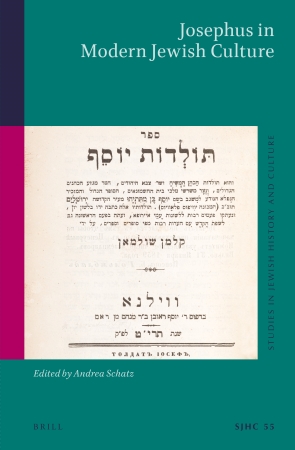
The cover features the title page of Kalman Schulman’s Sefer Toldot Yosef (Life of Joseph), Vilna, 1859. Schulman’s translations of Josephus’s works into Hebrew form a key step in the reception of Josephus in the 19th century.
This volume, edited by Dr Andrea Schatz (Leiden: Brill, 2019, xii + 360 pp.) traces for the first time from a variety of angles how the modern Jewish reception of Josephus’s life and work took shape.
The contributions by scholars from Europe, Israel, the UK and the United States explore the remarkable continuities, contrasts, and turns that characterize the reception of the ancient historian and his work among modern Jews.
Josephus was nearly omnipresent in modern Jewish culture: he was re-read and re-imagined as a companion for modern times among proponents of the Jewish Enlightenment, Wissenschaft des Judentums, the Reform movement, Modern Orthodoxy, socialism and Zionism, in Western, Central and Eastern Europe, in the Yishuv, and in the United States. The chapters of the volume – read on their own or in conjunction with each other – demonstrate that Josephus’s work could divide opinions and intensify divisions while also providing space for debates that reveal unexpected connections and affinities between individuals and groups that otherwise preferred to disagree with each other.
Throughout the volume it is apparent that Josephus remained important to modern Jews because of (rather than in spite of) the irresolvable complexities and ambiguities of his life and work.
The volume will be relevant for scholars and students of Jewish Studies, Jewish-Christian relations, History, Classics, Modern Literature and Reception Studies. It also addresses a wider public whose interest in Josephus continues to be stimulated by the image and site of Masada and by wider debates on history, memory, nation, and diaspora.
Table of Contents: